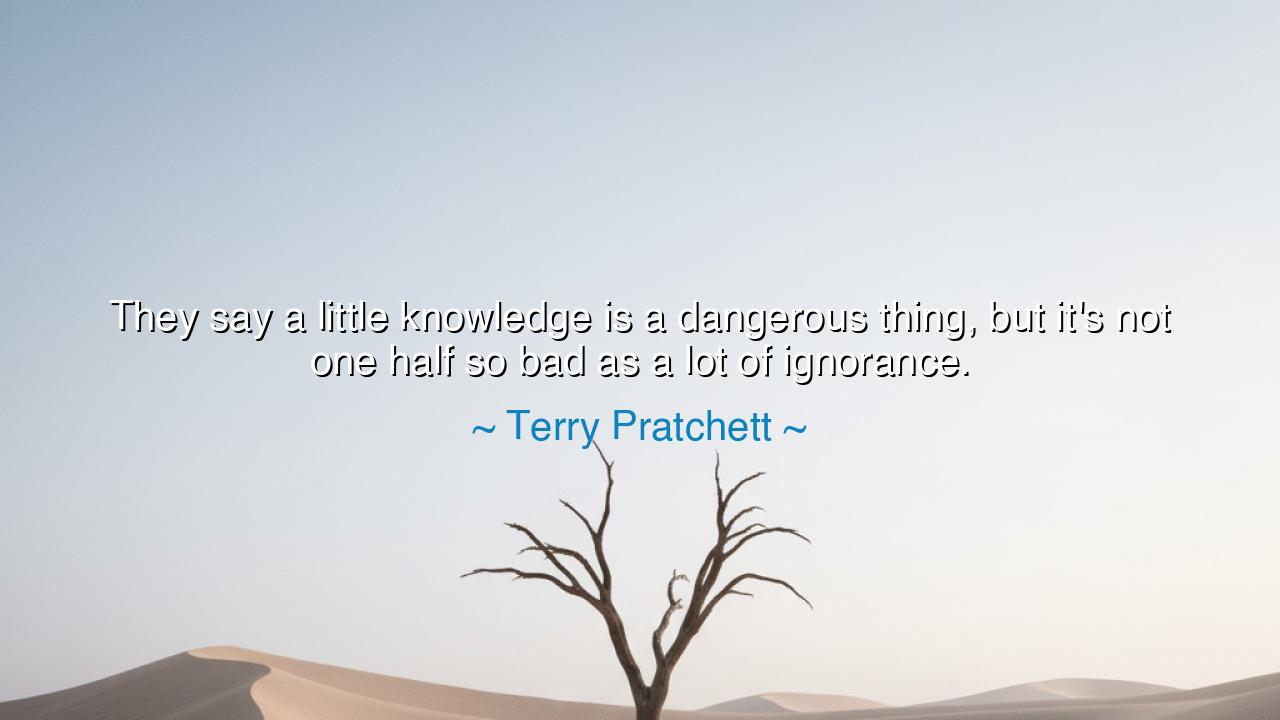
They say a little knowledge is a dangerous thing, but it's not
They say a little knowledge is a dangerous thing, but it's not one half so bad as a lot of ignorance.






Hear now the words of Terry Pratchett, the weaver of wit and wisdom, who declared: “They say a little knowledge is a dangerous thing, but it’s not one half so bad as a lot of ignorance.” In this saying is hidden both warning and encouragement. For though fragments of knowledge may mislead, they still bear the seed of truth. But ignorance—vast, stubborn, and unyielding—is a wasteland where no seed can grow, a darkness in which no light can glimmer. The true peril of humanity is not in small errors of understanding, but in the great void where no understanding dwells at all.
The ancients warned of the danger of a little knowledge. Alexander Pope, long before Pratchett, wrote that “a little learning is a dangerous thing,” for those who sip lightly at the springs of wisdom may think themselves masters while still half-blind. Such men act boldly, yet without depth, and their actions can bring ruin. Yet Pratchett, in his wry genius, reminds us that even this danger pales before the power of ignorance—for the one who knows something may yet be corrected, but the one who knows nothing has no foundation on which to build, no doorway to truth.
Consider the long ages when physicians, with partial knowledge, attempted to cure sickness through leeches and bleeding. Their knowledge was flawed, and yes, dangerous. Yet from their errors, progress came, for questions arose, and improvements followed. Contrast this with the centuries when entire peoples clung to ignorance, believing disease to be curses or demons, rejecting inquiry altogether. In ignorance there was no path forward, only suffering and stagnation. Thus, even flawed knowledge is a step toward wisdom, while ignorance is a chain that binds humanity in darkness.
History gives us another witness: the Age of Exploration. Many explorers set forth with a little knowledge—maps imperfect, stars half-understood, oceans mysterious. And yes, their errors brought peril. Yet from those ventures came discovery, exchange, and the knitting together of a wider world. Imagine instead if they had clung to ignorance, refusing to leave their shores. Entire continents would have remained unknown, and human progress stifled. Even imperfect knowledge can move mountains, but ignorance leaves mountains untouched and unmoved.
Pratchett’s words also contain a challenge: to despise ignorance not merely as absence, but as danger. For ignorance is not always innocent; it can be chosen, clung to out of fear or pride. Entire societies have been undone by it. Recall the witch hunts of Europe: knowledge of medicine was dismissed, and ignorance reigned, leading to terror and cruelty. Ignorance armed with fear is far more destructive than the errors of partial knowledge, for ignorance resists correction and multiplies harm.
The lesson, then, is this: do not fear a little knowledge. Embrace it, but never stop there. Let it be a beginning, not an end. Better to know a fragment and seek more, than to choose the emptiness of ignorance. For knowledge, even in small measure, sparks curiosity, and curiosity leads to deeper truth. Ignorance breeds only complacency and despair. The path of wisdom is not to despise small beginnings but to let them grow into greater understanding.
Therefore, beloved seekers, let your practice be this: when you learn a little, do not grow arrogant—grow hungry for more. When you meet the ignorant, do not mock them, but awaken their curiosity, for ignorance is the true enemy of progress. Read, question, listen, and explore, knowing that every fragment of knowledge adds to the fire of truth. And remember always Pratchett’s immortal wisdom: a little knowledge may be dangerous, but a lot of ignorance is death to the soul and to society. Choose knowledge, however small, and let it lead you ever onward.






AAdministratorAdministrator
Welcome, honored guests. Please leave a comment, we will respond soon